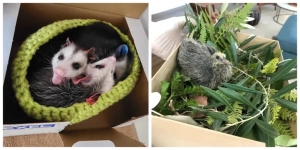Garden wildlife? Tips to keep critters and your pet safe and healthy

(Left) Three of the eight baby Virginia opossums orphaned by a car accident. Notice the colors on their ears? Our wildlife department uses a non-toxic, animal-safe paint to be able to tell them apart. (Right) The nestling band-tailed pigeon in its makeshift nest on the day it was found. The pigeon was successfully reunited with its parents in the wild.
With spring in the air, we are seeing the start to our busy season at Pasadena Humane. It’s the time when kittens begin to flow into the shelter, along with injured and orphaned baby wild animals.
Recently our animal control officers rescued eight baby Virginia opossums from a car engine. Their mom had been fatally injured when the car was started, but thankfully the babies were unharmed.
Our skilled team of wildlife specialists is now caring for the eight baby opossums at our Sandra J. Goodspeed Wildlife Center until they are big enough to be released back into the wild. While under our care they will learn to climb, forage for food, find good hiding spots from predators, and remain wary of humans — all essential skills to survive in the wild.
These orphans definitely needed our help at the shelter to survive after their mom’s death, but sometimes it is best to leave wildlife where they are.
For example, our Wildlife Helpline recently received a call for assistance with a nestling Band-tailed Pigeon found alone in a residential driveway. After our wildlife specialists asked questions and reviewed photos to make sure the young pigeon was healthy, our specialists instructed the bird’s finder to create a surrogate nest to reunite the nestling with its parents.
It worked! Over the next couple of weeks, the nestling’s parents returned to feed and care for the young bird. Our wildlife specialists watched the bird grow through regular photo updates. Eventually, the pigeon was fully fledged and jumped the nest on its journey to adulthood.
The arrival of wildlife baby season is an excellent reminder that we share our neighborhoods with wild animals. At Pasadena Humane, we believe in peaceful coexistence with wildlife. Our wildlife program is committed to creating a healthy, sustainable community that values all species, including wildlife and companion animals.
Here are some tips from our wildlife team to keep both pets and wildlife safe:
- Keep your cats indoors: The risk of injury and illness to both wild animals and cats is much higher when cats are allowed to roam.
- Make sure your pet’s vaccinations are up to date: Vaccines such as distemper, parvovirus and rabies are essential for preventing the spread of disease between wildlife and pets.
- Don’t let pets roam off-leash (including cats!): Use a 6-foot, non-retractable leash or shorter when taking your pets on walks and hikes. Even the best-trained dogs can cause severe disturbances in wildlife spaces if let loose. Also, cats prey on birds.
- Supervise your pets at night: Don’t let your pets go outside unattended. Many wildlife species are active at dusk and dawn, and some predators are active throughout the night.
- Do not leave pet food or standing water outdoors: Leaving food or water outside may attract wildlife. Raccoons, skunks, coyotes and even bears can pick up lingering smells of food. Enclose ponds and pools with fences topped with coyote rollers.
- Tidy up your yard: Prevent wildlife from visiting your outdoor spaces by picking up fallen fruit, cleaning up overgrown bushes, securing trash cans, enclosing gardens and cleaning and covering barbecues.
- Dispose of pet waste properly: Pet food and subsequent waste can cause a nutrient imbalance in our outdoor spaces if not removed.
If you need more assistance with wildlife, we’re here to help! For guidance on what to do if you’ve found an ill, injured or orphaned wild animal, text a photo and description to our Wildlife Helpline at 626-344-1129.
Plus, you can access species-specific fact sheets and flowcharts describing the best course of action for found baby animals on our website, pasadenahumane.org/wildlife
Dia DuVernet is president and CEO of Pasadena Humane.
This blog post originally appeared as a column in the Pasadena Star-News on February 25, 2023.


